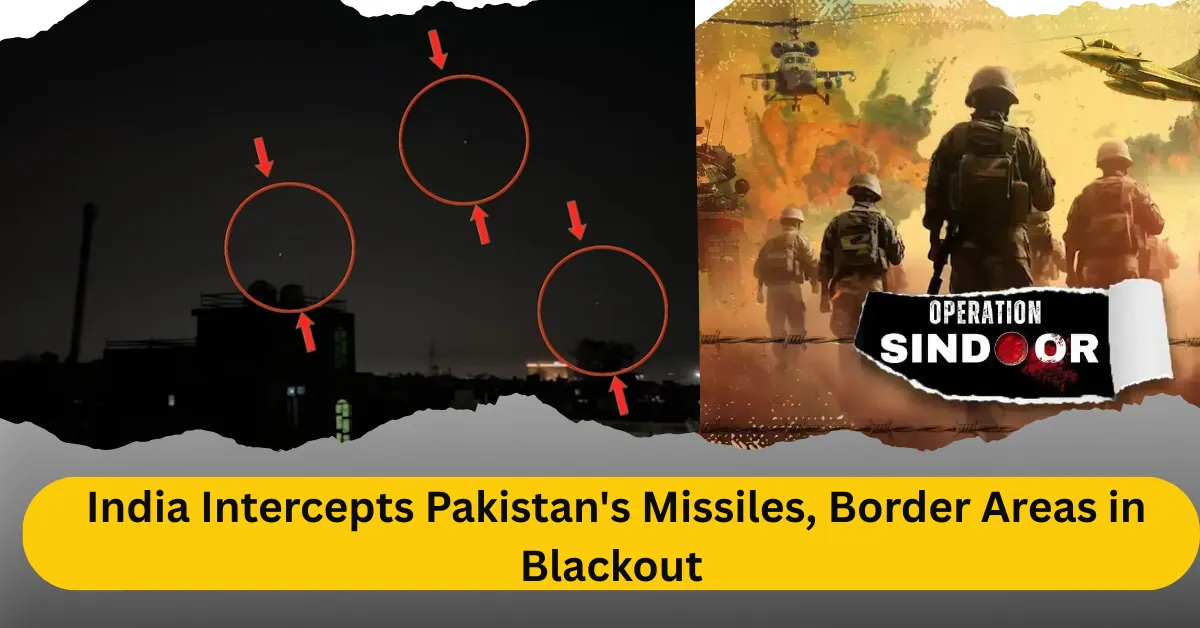In a dramatic escalation of the ongoing conflict, Pakistan launched a series of attacks targeting Indian military installations and civilian areas in Jammu and Kashmir, Rajasthan, Gujarat, and Punjab. These attacks, coming hours after India’s Operation Sindoor, were largely repelled by Indian forces, but have led to heightened tensions and precautionary blackouts in several states.
Shortly before 9 pm, loud explosions were reported in Jammu, followed by sirens and a widespread blackout. Locals captured cellphone videos showing streaks of light across the sky, indicating the active engagement of India’s Air Defence System in intercepting incoming missiles and drones. Cellphone services in parts of Jammu have been disrupted, further increasing anxiety among residents.
The attacks specifically targeted military stations in Jammu, Pathankot, and Udhampur, along the International Border in Jammu and Kashmir. The Defence Ministry confirmed that Pakistani-origin drones and missiles were involved. In a statement released on X (formerly Twitter), the ministry asserted that the threats were “swiftly neutralised using kinetic and non-kinetic capabilities” and that India remains fully prepared to defend its sovereignty.
Sources within the Indian armed forces reported the downing of a Pakistani F-16 supersonic fighter jet, which had taken off from Sargodha air base in Pakistan. This was achieved using an Indian surface-to-air missile defense system.
Punjab’s Pathankot, a strategically important city located approximately 30 km from the International Border, also came under heavy artillery fire from Pakistan.
In response to the attacks, authorities have implemented complete blackouts in the border areas of Jammu and Kashmir, as well as in Chandigarh, Ferozepur, Mohali, and Gurdaspur in Punjab, and parts of Rajasthan and Gujarat.
The ongoing IPL cricket match between Punjab Kings and Delhi Capitals at the HPCA stadium in Dharamshala, Himachal Pradesh, was cancelled. The stadium was evacuated, and its lights were turned off as a precautionary measure.
The Bureau of Civil Aviation Security has directed all airlines and airports across India to enhance security measures. These include mandatory secondary security checks for all passengers, restricted terminal access, full CCTV surveillance, increased deployment of air marshals on flights, and stricter vehicle and passenger checks at entry points.
Foreign Minister S Jaishankar has spoken with US Secretary of State Marco Rubio. According to US State Department Spokesperson Tammy Bruce, Secretary Rubio emphasized the need for immediate de-escalation and expressed US support for direct dialogue between India and Pakistan.
These events follow India’s Operation Sindoor, a series of precision strikes on terror bases in Pakistan and Pakistan-occupied Kashmir, conducted in response to the recent terror attack on tourists in Kashmir’s Pahalgam. The Indian government and military have stressed that these strikes were non-escalatory, precise, controlled, and measured.
Pakistan retaliated with attempts to target military installations in 15 Indian cities, including Srinagar, Pathankot, Amritsar, Ludhiana, and Chandigarh. However, these attempts were largely foiled by Indian armed forces. India’s military response included targeting and neutralizing Pakistani air defense radars and systems in several locations, including Lahore.
The Indian government has stated that its forces’ response was “in the same domain (and) with the same intensity” as the attacks launched by Pakistan, reiterating its commitment to non-escalation, provided it is respected by the Pakistani military.
FAQs on India-Pakistan Conflict and Retaliation
What areas were attacked by Pakistan?
Pakistan launched attacks on Jammu and Kashmir, and military stations in Rajasthan, Gujarat and Punjab.
What was India’s response to these attacks?
India retaliated by intercepting missiles and drones, targeting and neutralizing Pakistani air defense systems, and downing a Pakistani fighter jet.
What is the current situation in the border areas?
Border areas of Jammu and Kashmir, as well as parts of Punjab, Rajasthan and Gujarat are under complete blackout.
Why were blackouts imposed?
Blackouts were imposed as a precautionary measure.
What was the US Secretary of State’s reaction?
US Secretary of State Marco Rubio emphasized the need for immediate de-escalation and expressed US support for direct dialogue between India and Pakistan.
What is Operation Sindoor?
Operation Sindoor was India’s precision strikes on terror bases in Pakistan and Pakistan-occupied Kashmir, conducted in response to the Pahalgam terror attack.
How has the Indian government described its strikes?
The Indian government has described its strikes as non-escalatory, precise, controlled, and measured.
Were there any civilian casualties reported?
The article does not mention any civilian casualties.
What impact did the conflict have on sporting events?
The IPL cricket match between Punjab Kings and Delhi Capitals in Dharamshala was cancelled.
What additional security measures have been implemented?
The Bureau of Civil Aviation Security has directed all airlines and airports across the country to enhance security measures.

